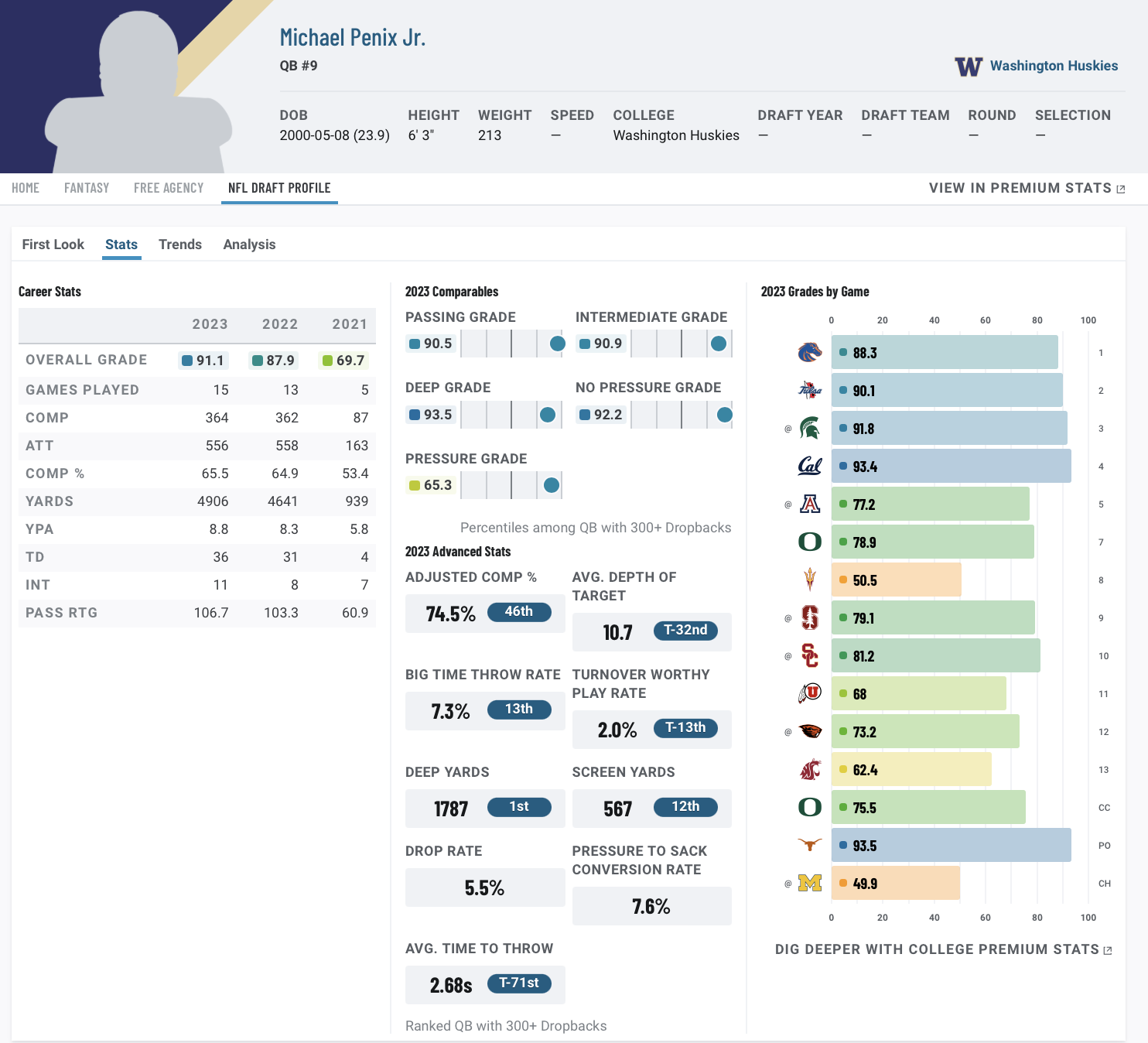• The Falcons simply value having a succession plan at quarterback: Atlanta is essentially valuing a succession plan above any single player they could select at No. 8 overall. That’s certainly unusual, but it’s not crazy.
• The Green Bay Packers have found success with a similar strategy: Twice in a row, the Packers have selected their future quarterback in the first round years before they needed to deploy him on the field and watched him have instant success when they finally made the transition.
• Draft and trade for yourself: Try PFF's Mock Draft Simulator — trade picks and players and mock for your favorite NFL team.
Estimated Reading Time: 6 minutes
Click here for more draft tools:
2024 Mock Draft Simulator | 2024 Big Board | 2024 Draft Guide
2024 Player Profiles | 2024 Mock Drafts | NCAA Premium Stats
The Atlanta Falcons made one of the most shocking draft picks in NFL history when they selected Washington quarterback Michael Penix Jr. at No. 8 overall in the 2024 NFL Draft after signing Kirk Cousins to a $180-million contract just weeks before.
The move is unprecedented when you consider all of the various elements at play.
The decision was roundly criticized, with even smart NFL evaluators failing to see logic in the approach, and it led to the Falcons receiving the lowest draft grades by most analysts.
I’m not here to defend the move, as such, but rather to say that, at the very least, it isn’t stupid or incoherent. The strategy deployed by the team is very real and not inconsistent with other moves they have made.
Did they reach?
One issue people had is that Michael Penix Jr. was ranked 31st on the consensus big board as the fifth-best quarterback. Atlanta selected him as the fourth quarterback off the board and 23 places higher than his big board rank.
Generally, there is not a good history of teams going rogue versus the consensus board, and “reaches” typically underperform relative to players selected in the same range as their rank on the consensus board.
This was not a typical draft, however, and the Falcons clearly had Penix ranked higher than most other players. The important part, though, is that they don’t appear to have been alone in that regard. Multiple other teams have been reported to be very high on Penix, and so it looks as though there was at least a group of NFL evaluators who believe Penix is a better prospect than the consensus board does. This was not just the Falcons operating in isolation.
Even the draft narrative on his stock had him ranked around that area before the national championship game. The talk after Penix defeated Texas in the College Football Playoff was that he was now a mid-first-round prospect who could push himself into the top 10 by April. Then, Michigan steamrolled Washington and, in the course of four hours, his stock fell an entire round in the public sphere. Maybe the NFL simply never made that same adjustment based on one game against a better opponent.
The Succession Plan
We are also mere months removed from lauding the Green Bay Packers for having cracked the code to quarterback development. Twice in a row, the Packers have selected their future quarterback in the first round years before they needed to deploy him on the field and watched him have instant success when they finally made the transition.
Aaron Rodgers was drafted in 2005 and didn’t get the job until the 2008 season, while Jordan Love had to wait the same three years on the sideline before being tossed the keys to the franchise.
Other quarterbacks have been drafted with significant picks despite entrenched starters in the past. After Troy Aikman’s rookie season, Dallas spent a first-round supplemental draft pick on Steve Walsh mere months later, using a pick that would go on to become the No. 1 overall selection in the following draft due to a 1-15 record the Cowboys compiled.
Denver drafted Tommy Maddox in the first round in 1992 despite John Elway still being in the middle of his career.
When starters have been on borrowed time, the approach has been even more common. Patrick Mahomes was selected — even traded up for — with Alex Smith entrenched as the team’s starter.
Kirk Cousins is 35 years old coming off an Achilles injury, so planning for his eventual successor makes perfect sense. With the Falcons potentially going to be hit with a tampering penalty that could remove critical draft picks, as well as Cousins likely good enough to drag their future picks down the draft, this may be a year earlier than most teams would do it, but it wasn't out of the realm of possibility.

The Opportunity Cost
The thing that really makes this move unprecedented is that it was the No. 8 overall pick used to make it happen.
Rodgers, Love and Maddox were all selected in the 20s, and while the pick that was used to select Walsh ended up far higher than that, Dallas didn’t know that at the time.
What the Falcons have done here is essentially value a succession plan above any single player they could select at No. 8 overall. That’s certainly unusual, but it’s not crazy.
The team is already well stocked on offense, where you would typically expect resources to be spent to maximize the chances Cousins can succeed. The Falcons were expected to make the first defensive selection in the draft, and individual defensive players can certainly make an impact, but they tend not to be transformative.
Nailing a succession plan at quarterback can be transformative, for over a decade.
If the Falcons believe that there is virtue to a quarterback learning and developing from the sideline, then they view this as simply maximizing the chances their next quarterback hits the ground running — at the cost of one defender right now and around half of his rookie contract surplus value.
It certainly detracts from their ability to have success in 2024, but it’s not an incoherent strategy to attempt to prioritize long-term success as well as winning the following season. The Kansas City Chiefs traded away wide receiver Tyreek Hill not because they think it maximized their chances of winning the following season but because it was in the long-term best interest of the team without completely undermining their chances in the short term.
Cousins is a quarterback good enough for the Falcons to immediately contend for the division and make noise in the postseason, while Penix is the quarterback the team believes is the one who can win for the next 10 years after Cousins.
The fact that he will be 24 years old this season shouldn’t change the evaluation much. The entire theory rests on the idea that there is growth to be done from the sideline in the NFL, and so the relevant information is where they believe his ceiling is in absolute terms, not simply for his age. If Cousins plays two more years before they look to get out of his deal, Penix will start at 26, which could give him a decade or more.
The Bottom Line
Whatever else it is, the Falcons' move to select Michael Penix Jr. mere weeks after securing Kirk Cousins in free agency is one of the most radical picks in NFL draft history. It is one of the biggest stories in years and, with no possibility of ever seeing the counterfactual play out, is one that we can never know for sure was the right call.
If Penix becomes a high-level starter, the Falcons will feel they did the right thing. But without knowing how the alternative player they would have selected could impact the team, it’s still guesswork.
And that is why we all love the NFL draft.





 © 2024 PFF - all rights reserved.
© 2024 PFF - all rights reserved.